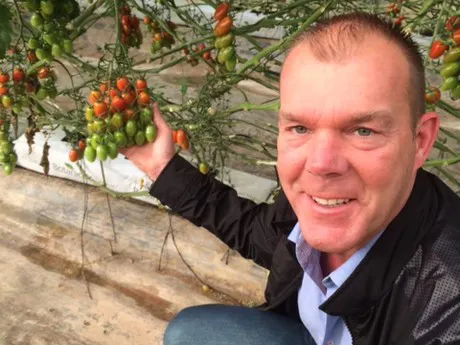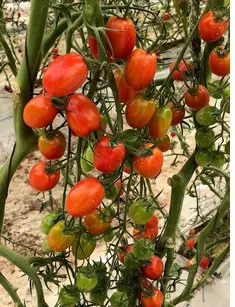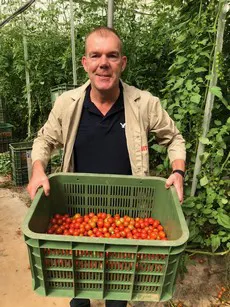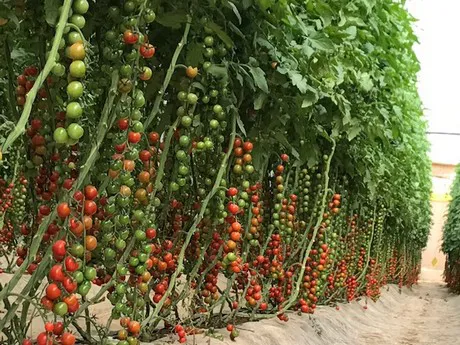In recent years, the Moroccan tomato production has steadily grown. However, Moroccan exporters and European importers don’t always have good, mutual experiences. Relationships are the key to success, emphasises Jean-Paul Nuijten of Special Tom. He is specialised in the import from Morocco and Spain. Last year, he started his own production project in the North African country.

“A lot of Moroccan exporters have had bad experiences with export to Europe in the past,” he says. “They might be partly to blame for that, but importers have to help exporters as well.” Those who invest in their relationship with the Moroccan traders, can be successful. When Jean-Paul started his own business in 2014, he already had contacts in Morocco. Those suppliers helped him build his company. “We started with baby plum tomatoes, but we soon also had cherry, cherry vine and round tomatoes in our assortment.”
 Import tomatoes are a totally different market
Import tomatoes are a totally different market
“When your affairs aren’t in order, import from Morocco is doomed to fail,” Jean-Paul knows. “It’ll cost you.” For example, it’s important to regularly visit suppliers. At the moment, Jean-Paul has two employees that inspect the production and packing stations in Morocco, and who give indications about expected volumes. A lot of young people work in the office as well. Although he started as a one-man business, the office now has 11 employees. “Most of them don’t have a background in fresh produce, so we train them ourselves.” This takes a lot of time, but Jean-Paul doesn’t mind.
“The market for import tomatoes can’t be compared to the market for Dutch tomatoes,” he continues. The biggest difference is due to transport times. From the North African country, the tomatoes are on the road for four to five days. The tomatoes are harvested two to three days before that. The packing station and transport are therefore crucial factors for the quality of the tomatoes. The majority of the transports is done via lorries. Seaborne cargo only becomes interesting when the market drops and transport via roads becomes more expensive as a result.
 Import levies and quotas
Import levies and quotas
Besides, import from Morocco is only interesting in the months without import levies and when prices are high enough to compensate for the levies. “Levies are dropped on 1 November, and we can then import until 1 April,” Jean-Paul explains. The Moroccan government implements export quotas for the growers, which limits supply. On the other hand, the EU implements import levies on Moroccan tomatoes to protect the market. “From Spain, we import tomatoes 12 months of the year. We can import from Morocco for eight to nine months.” Some companies in Morocco have programmes with European retailers for 12 months per year nowadays.
This year, the supermarkets had Dutch tomatoes longer. That made it difficult for the import of tomatoes from Morocco and Spain. “German retail in particular had Dutch Santas for a long time. This definitely affected pricing for the import tomatoes in the months of September and October,” Jean-Paul says. Because of the changeable weather, the Spanish season had a delayed start. In 2017, the entire season was “dramatic.” Prices were high, but because of the disappointing harvest, there wasn’t enough Spanish product to sell. “The Moroccan production of round tomatoes received quite a blow in 2017, a lot of growers decided to do something else.” These growers have chosen to grow soft fruit such as raspberries and blueberries for example. The younger generation in Morocco is different from the older one. “They all have a good education, they know what they’re talking about,” he explains. “Besides, they all speak several languages.”
Although demand peaks in the winter months, Northwestern Europe also has demand for Spanish tomatoes in the summer months. The Netherlands, Germany and Scandinavia are the most important markets for Special Tom. Part of the import is sent directly to customers, the remainder is distributed after a stop-over in Breda.

Own production and expansion of the assortment
As of last year, Special Tom has had their own production in plastic greenhouses in Agadir. As the son of a grower, Jean-Paul has experience in the production of tomatoes. “The plants grow on coconut matting, so that we remain free of viruses.” An additional advantage is that applying manure and water can be guided better, so that flavour is improved. He also shares this knowledge of the tomato production with other growers. “By guiding growers, results increase. A lot of growers are investing in the development of the production and the production on coconut matting is a good option in that case.”
Morocco has four production regions for tomatoes. Jean-Paul’s greenhouse can be found in Agadir, in the north of the country. Roughly 250 kilometres south is the Guilmim region, and another 100 kilometres to the south is production region Safi. The most southern production region is Dahka, 1,200 kilometres from Agadir. To keep his knowledge up-to-date, Jean-Paul also visits production companies in countries such as Spain, Turkey and Egypt. “We’re trying to extend supply to other countries, such as Senegal and Egypt,” Jean-Paul continues. Algeria is another option, but the export is not made any easier by that country’s bureaucracy.
This year, the company will celebrate its fifth anniversary. Special Tom grew rapidly in these five years. “I started on my own, but I now employ ten people,” Jean-Paul explains. Logistics are taken care of by Frigo Breda, which is also where Special Tom is located. The company’s core business is the import of Spanish and Moroccan product. Although they started with Moroccan tomatoes, they grew into an import company for products such as bell pepper, melons, stone fruit, citrus and other products. “California, sweet pointed, white pointed, palermos,” Jean-Paul sums up some bell pepper varieties he imports from Morocco. “These grow well in this country. The UK and Eastern Europe in particular have good demand for these bell peppers. This year, we’ll also have a good programme for citrus from Morocco, under our own brand Jillies, which was named after my youngest daughter.”
More information:
Special Tom
Jean-Paul Nuijten
jp@specialtom.com
www.specialtom.com
